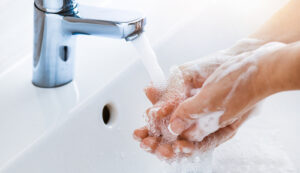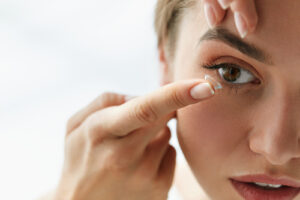7 Things to Do for Proper Contact Lens Hygiene
Whether you wear contact lenses every day or only for certain occasions, it’s important to know more than just how to insert and remove them. By properly caring for your contact lenses, you are effectively taking care of your eyes and avoiding infection.
As a result, you’ll be able to enjoy your glasses-free vision for a long time to come. Keep reading to discover seven things to do for proper contact lens hygiene!
1. Wash Your Hands Before Handling Your Contacts
Even if you don’t feel like your hands are necessarily dirty, you should always wash them before touching your contacts. Anything that is on your hands can end up on your contacts and in your eyes. 
When your eyes are exposed to germs, it can lead to infection. To thoroughly wash your hands, use warm water and lather your hands with a fragrance-free soap.
The CDC recommends scrubbing your hands for at least twenty seconds to adequately kill off any bacteria. Then rinse off completely because any soap residue can irritate your eyes.
After washing your hands, dry off with a lint-free towel. Other kinds of towels can shed fibers that stick to your hands and your contacts.
2. Clean Your Contacts Regularly
Do you know how to properly clean your contact lenses? Rinsing them off in your contact solution for a split second is not enough.
After washing your hands, place a contact in your palm and apply a few drops of new contact lens solution from the bottle. Gently rub the contact in the solution for about ten to twenty seconds.
Then rinse it with fresh solution and store it in a clean case. It’s a good idea to clean your contacts once a day.
For extended-wear contacts, always clean them before returning them to your case.
3. Use the Correct Contact Lens Solution

When you’re shopping for a contact lens solution, you’ll notice that you have quite a few choices. Instead of simply grabbing whatever bottle is in front of you, take a moment to make the right decision for you, your contacts, and your eyes.
Some contact lenses are meant for daily use, while others target extended build-up and should be used less often. Some contact lens solutions are primarily made up of hydrogen peroxide.
Hydrogen peroxide solutions are often good for sensitive eyes and rigid gas-permeable lenses. Watch out for saline solutions.
These are intended for rinsing, not cleaning. If you’re unsure which contact lens solution is right for you, talk to your eye doctor.
They will be more than glad to make a recommendation. Never use water to clean your contacts.
Contact lens solution is specially formulated to act as a disinfectant and to preserve the structural integrity of your contacts.
4. Clean and Replace Your Contact Lens Case Regularly
A clean case is just as important as clean contacts. Many people get in the habit of topping off their existing contact lens solution, but this can lead to germ build-up.
After inserting your contacts, drain all solution out of the case, squeeze in some fresh contact lens solution, and rub this around the same way you do with your contacts. Then, rinse it and leave it out to dry.
When was the last time you got a new contact lens case? No matter how clean you keep it, you should purchase a new one every one to three months. This will help ensure that your contact lenses are being stored properly.
5. Avoid Sleeping in Your Contact Lenses

You should always remove your contacts at the end of the day before you go to sleep. Sleeping in your contacts, even for a short nap, is not good for your eye health.
Contacts decrease the amount of oxygen that can reach your eyes. When you’re sleeping, this amount of oxygen is even less. As a result, your eyes can feel dry and irritated.
It can also damage your cornea and even lead to infection. Make the safe choice and always remove your contacts before sleeping.
6. Replace Your Contact Lenses as Directed
There are many types of contacts available, some for daily use, weekly use, or even monthly. Whichever type you choose, only use them for the intended amount of time.
Daily contacts, for example, are not made to withstand continuous use beyond a day or the accumulation of bacteria. When you wear them for longer than intended, you risk your vision and eye health.

If you wear extended-use contact lenses, it may help to mark it on your calendar when you will need to replace them. That way, you can be sure to remember.
7. Don’t Get Water in Your Eyes
Water may seem harmless, but it is not safe to get most types of water in your eyes. This includes pool water and natural bodies of water, but it also includes the tap water that comes out of your sink and shower.
This water has not been purified and can contain many potential contaminants that can damage your contacts and harm your eyes.
Don’t wear contacts in the shower, pool, or when doing other water activities, and always use contact lens solution to clean your contacts.
Do you want to break free from glasses and try contacts? Or do you have questions about your contact care? Schedule an appointment at Complete EyeCare West in Columbus, OH, today!







